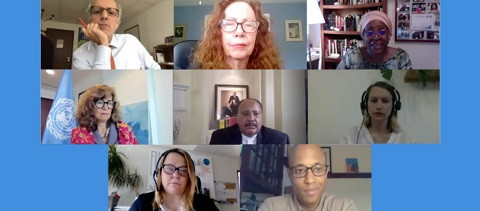
GCED Basic Search Form
Quick Search
현재 위치
뉴스

Martin Luther King III, a global human rights activist, and a distinguished panel of experts gathered for the second edition of the UNESCO Regional Expert Consultation Series held on 29 September 2020, focusing on the North American region. Together, they deconstructed the impact of racism and discussed ways forward.
In the context of the COVID-19 pandemic, the vulnerabilities of disadvantaged populations, including minority communities, have been further exacerbated.
“The #BlackLivesMatter movement was the result of the systematic racism that permeates the US society. If the movement allowed people to talk about systemic racism against black communities, now it is important to move forward and develop a plan of action,” Mr King said.
Professor Jane Landers, Member of the International Scientific Committee of UNESCO’s Slave Route Project, underlined the need to go beyond the ethnocentric narrative in education and teach history in a different way from what has been done so far. According to her, “UNESCO should work on the democratization of knowledge” through the development of innovative online resources using modern and more visual materials which would allow isolated and disadvantaged communities to access knowledge.
Raising the importance of the intersectionality of discriminations, the Founder of the Black Canadian Studies Association, Professor Naa Afua Dadesen Cooper observed that “racism against black communities is still widespread in specific regions”, and as in the United States, black communities in Canada are most affected by the pandemic. This is due to the fact that Black Canadians, especially women, are employed in high-risk sectors such as healthcare, and have already increased rates of pre-existing illnesses. While urging societies to oppose racial capitalism, Professor Cooper stressed the importance of “reallocating resources for the development of black communities.”
Alice Miquet, President of Montreal’s Youth City Council, shared the ways on how meaningful youth participation can be achieved in counteracting racism and discriminations. The Council recommended the following policy responses to the City of Montreal: take actions to increase the representation of racialized communities in decision-making positions, provide information on elections (both on how to vote and run for election) in all the languages spoken by at least 2% of the population, and devote a percentage of the city budget to organize cultural activities led by racialized communities.
Webster, hip-hop artist and author of several books on slavery, who collaborates with UNESCO in the Master Class Series against Racism and Discriminations, urged to “change the pyramid” in accessing the different narratives of knowledge. He indicated that “One of the main problems of racism is that people do not listen enough to those who are victims of discriminations based on race and ethnicity. People need to listen more to racialized communities and to understand them.”
As part of his recommendations to UNESCO, Mr King encouraged the development and implementation of diversity and sensitivity trainings targeting students, from primary to tertiary levels, which will “create a different world at the end of the day”.
Organized by UNESCO, this Series aims to unpack the societal challenges of the COVID-19 pandemic related to racism and discriminations and seeks to facilitate the necessary deep reflection on what direction the international community should take amid a renewed emergence of racist agendas.
This edition was moderated by George Papagiannis, Chief of Media Services at UNESCO. The first edition, focusing on the African region, was held on 18 September 2020. The next regional consultations are scheduled throughout the month of October.
- Watch the VOD of the webinar
- More information on UNESCO’s work on Fostering Rights, Inclusion and Non-Discrimination
URL:
https://en.unesco.org/news/martin-luther-king-iii-and-experts-call-action-aftermath-blacklivesmatter
